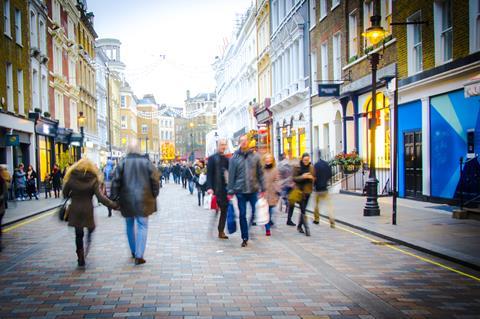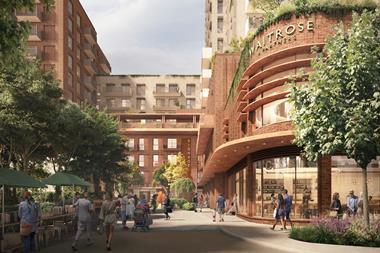With the latest grim news of retail closures from high street stalwarts such as John Lewis and Boots putting thousands of jobs at risk, the pressure on retail continues to grow.

The demise of the old high street model is something that retail veteran Bill Grimsey has been banging on about for years. However I’m not convinced that we have been listening. Some seven years ago, the first Grimsey Review highlighted the decline of the high street, and the futility of clinging on to a sentimental vision of the past. He urged that the high street had to be re-invented as a community hub, including but not reliant on retail. His recommendations seem to have been largely ignored other than in Roesalare, a town in Belgium, where Grimsey’s recommendations have been whole heartedly embraced to good effect.
Five years later, in 2018, Grimsey Review Two celebrated examples of towns that had started to repurpose their high streets and called on central government to remove barriers to progress. Despite limited take up in the UK he has persevered. With online retail sales rising to 40% during COVID, Grimsey saw that he had to intervene again. His recent COVID supplement, setting out his ‘build back better’ vision calls for the huge acceleration of existing trends brought about by the pandemic to finally bring about an acknowledgement that the old model of the high street is broken and that the new model will require a massive shift in power away from central government to local communities, giving them a stake in their town centres and reinventing town centres as gathering places that are central to community activities.

In an excellent High Streets Task Force webinar, Grimsey explained that this will require a huge shift in power from central government to local communities, putting the people best able to lead that change in charge. ‘Localism on steroids’, as he calls it, needs visionary and commercial town leaders who can come up with ambitious solutions. This will require collaboration between councils, communities and local stakeholders. Clearly this is something in which Business Improvement Districts can play a key role.
Do not think the clone towns of the last century will suffice, he warns, whilst bravely admitting that his generation have been part of the problem and that ‘what you built needs to be unpicked.’ Hopefully his words will finally be heeded and we will see our town centres become reacquainted with their sense of community, purpose and heritage, whilst kicking their addiction to retail.
These trends can also be seen internationally. In Paris, Anne Hidalgo has just been re-elected as mayor on a promise to make the city more people-friendly by removing cars and maximising space for pedestrians and cyclists. Like Grimsey, she recognises that cities of the future will no longer be designed exclusively around the car, nor will they be dependent on retail.
In an inspiring example of what good local leadership can achieve, plans have been approved for Barking and Dagenham’s Hollywood-style Dagenham Film Studios on a 22-acre former pharmaceutical factory site. The studios are set to provide 140,000 sq ft of sound stages, 85,200 sq ft of offices and 174,500 sq ft of workshops. Council leader Darren Rodwell said: ‘This will mean thousands of jobs and educational opportunities for local people.
Where once Dagenham was known for Ford and factories, we will be making films and a new bright new future for our borough.’ Undeterred by losing the project’s original backer, who apparently pulled out over Brexit concerns, the council has pressed on alone.
Over the past five years the council has built up its own film unit, which has already attracted films such as Marvel’s Avengers: Age Of Ultron, Black Widow and Doctor Strange, as well as hit TV dramas including Netflix’s Black Mirror. The Council estimates the film studios will bring an initial 1,200 extra jobs to Barking and Dagenham. Eat your heart out Hollywood, Dagwood (as promoted by Be First, the Council’s regeneration firm) is the place to be!
Whilst much can be achieved by good local leadership, right now we could do with some central government action to clarify its current messaging. With other businesses now open, we need to encourage workers back to the office in order to reinvigorate the economy post lockdown. It has become abundantly clear since our shops and hospitality businesses reopened their doors that so many are reliant on their office worker clientele. But current government advice is still to work at home if you can. Also, travelling to work, when such a large number rely on public transport for their commute, is clearly ‘a weak link’.
The advice from Transport for London is still to avoid using public transport to make non-essential journeys and to cycle or walk where possible and government advice is to‘consider all other forms of transport before using public transport’. Inevitably this means that unless and until guidance is changed, the return to the office will be slow especially for those reliant on public transport. In the meantime, the closure of 30 Pret units is indicative of what will happen if office workers feel unable to return safely, and other closures are likely to follow.
With corporates such as Fujitsu and Twitter announcing permanent remote working plans, there is the risk of overlooking the many reasons we congregate in offices. As Helical CEO, Gerald Kaye quite rightly says in his recent Property Week piece ‘I fear the damaging impact on the young, who will pay for this in years to come. Mentoring and learning from colleagues, as well as acquiring interpersonal skills and emotional intelligence, can be achieved better in the office and much less so from Zoom calls.’
So by all means let’s embrace the positive learnings from this enforced home working experiment but let’s make sure we don’t throw out the baby with the bath water, so to speak.
Susan Freeman is a partner at Mishcon de Reya
Related blogs by Susan Freeman:
- Propertyshe perspectives: our new reality, climate change and the Mipim editor’s dinner






























No comments yet